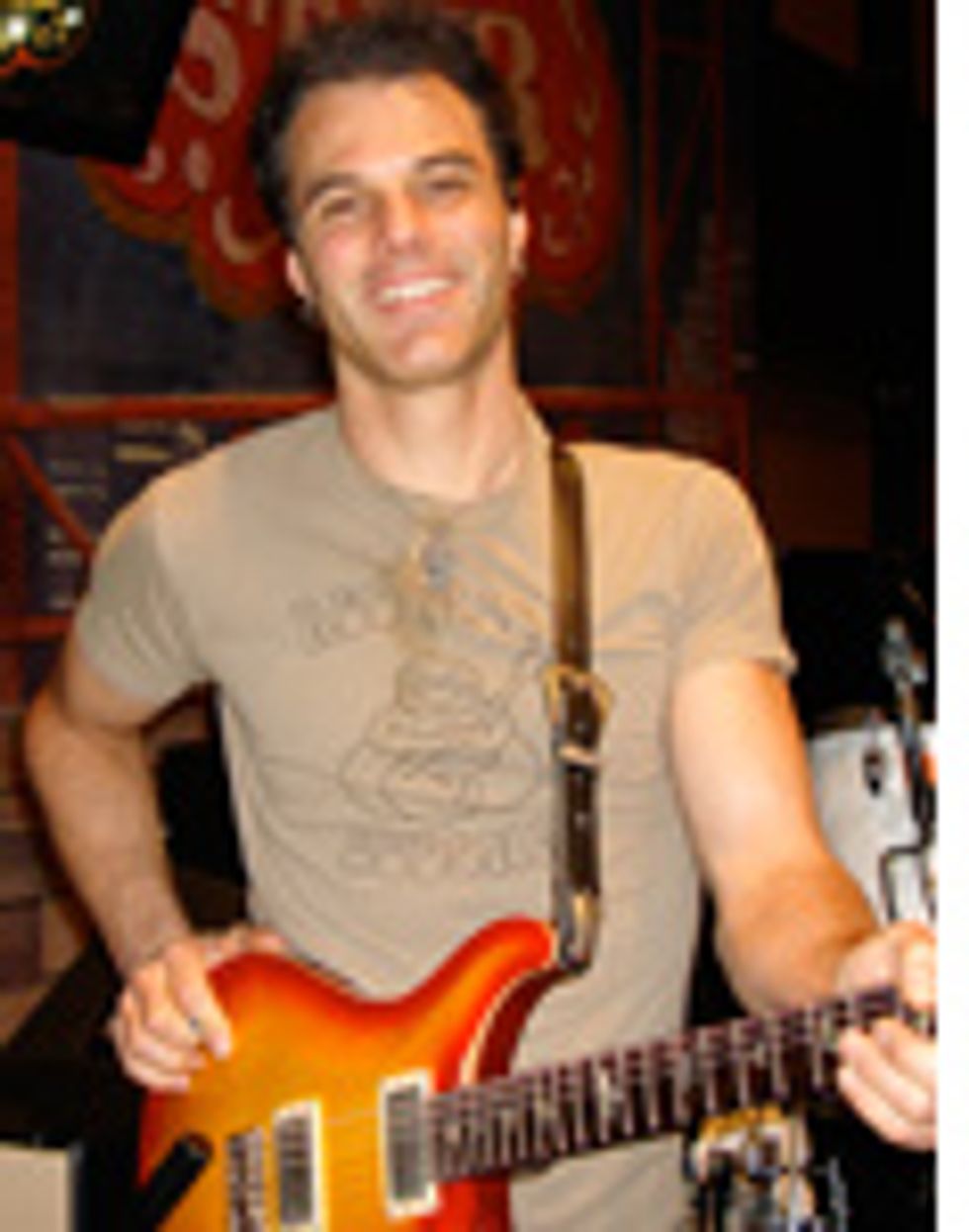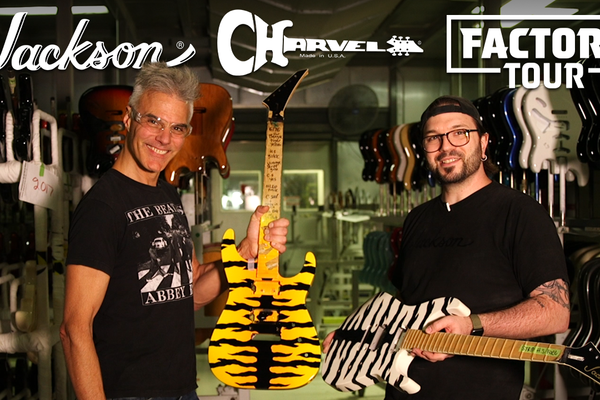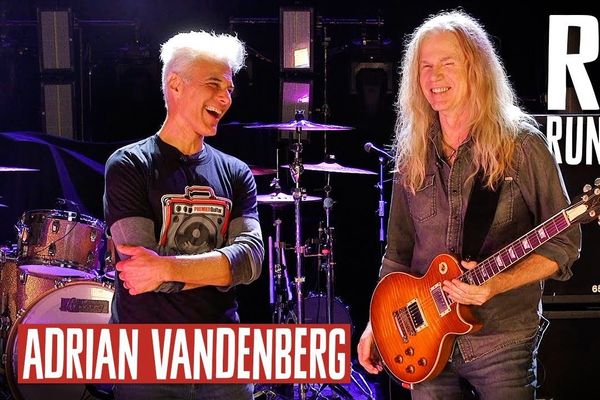Eat your vegetables -- it pays off
Working in bars taught me to play. All those songs and licks I worked on in my parents’ basement were worthless noise until my guitar teacher took a chance and hired me to sub some bar dates with him. My parents, open-minded, nurturing of the arts and no strangers to honky tonks, chaperoned the first couple gigs, hanging from 9 to 1:30 a.m. Permitted – nay, encouraged – to crank my old Vibroverb past the pain threshold, flail away on my poor Asian imitation of a Les Paul into the early morning and to be rewarded with $50 in sweaty, smoky, crumbled bills was like hitting the lottery for a 15-year-old Montana boy. Like an alcoholic’s first beer, that night hooked me for life.
I searched tirelessly for more gigs – my version of chasing the dragon – and worked my way into about 1000 anonymous bands that all had roughly the same set list and working circuit. I really grew as a player during that fourth set, where the crowd and band enter that unguarded, devil-may-care, let’s-try-this mindset, brought about by fatigue and inebriation. You quit worrying about mistakes; you’re playing, not thinking. Once you’ve played everything you know, you are forced to play what you don’t know. The sheer boredom of four hours of playing forces experimentation with different tones, dynamics, timing and space. There’s also a strange para-psychological phenomenon where you begin to read other players’ minds – catching yourself spontaneously falling into triplet patterns with the drummer, harmonizing with the other guitarist or fiddle. You develop in clubs because there is the luxury of time that you don’t have anywhere else.
Ironically, the better your career goes the less time you have to play. In regular recording sessions the meter is running at a frightening premium. There’s rarely time for mistakes, much less experimentation, because you have got to get those four tracks down quickly. In television you’re playing very precise intros, outros and songs that need to fit perfectly within the time constraints of the program (Although I did witness an exception to this rule when I played Leno recently – Kevin Eubanks and his guys really throw down during those commercial breaks. The best stuff they do all night goes unheard by the television audience.). In a three-hour award show, you usually play three minutes – happily, you are paid for the entire three hours.
Big tours rarely allow much jam time; unless you’re playing for Bruce Springsteen, live concerts rarely last more than two hours. I spent one summer playing with an act on Asylum Records who was one of about seven opening on this huge stadium tour for George Strait that we called Bubbapaloosa. The gigs were routed every Friday through Sunday for about four months. We would leave Thursday, arrive at the venue Friday, do our 30 minute soundcheck, hang out at catering until our 30 minute set and then catch a plane or bus to the next town. That’s probably about two hours of playing over a four day period, and it’s not really playing because there’s no room to stretch except for maybe five minutes of soundcheck after the monitors are rung in and they’ve completed those unbelievably tedious kick/snare/hat checks. I finish a run like that and I’ve forgotten how to play.
For the past eight months I have been trying to play once a week in Nashville clubs (usually Tootsie’s and/or The Palace) with two friends of mine, Megan and Marcus Mullins. We call ourselves The Saloonatics, which seems pretty fitting. It’s a tip gig, so the money weighs in just below minimum wage. On slow nights some of us – I’m not naming names – spend more on beer than we earn, and that’s factoring in the band discount on drinks. We have to hunt for parking, schlep our gear many blocks, put up with surly soundmen, broken monitors, stupid drunks in the crowd and play for four hours without a break. As unappealing as that may sound, it’s kind of like exercising and eating your vegetables – you have to do it in order to stay healthy.
For the first six months we played mainly old country stuff and I would switch between guitar, pedal steel and mandolin. Megan and Marcus traded off between fiddle, guitar, mandolin and even keys on one truly experimental (read: trainwreck) night. Eventually the club owner tired of our old time repertoire and told us that if we wanted to keep playing, we had to be the house band for their open mic variety show, backing up a few very solid singers and some not particularly gifted sitter-inners who, baffling as it may be, are compelled to share their lack of talent with the world. Most nights we genuinely enjoy it. Playing a random request that we’ve never attempted but may have heard a few times on the radio is the equivalent of doing the New York Times crossword – it kick starts the memory banks and stimulates parts of the brain that are rarely called into action.
Because of the torturous nature of this low dollar gig, we can’t lock in a regular rhythm section and rely on a revolving cast of drummers and bassists with a more merciful, less mercenary mindset. The music business is like AA or AAA baseball; you lose players all the time as they are drafted up to the majors, exiled because of poor performance or sent to rehab. Last week all of our standbys declined the offer. Fueled by last-minute desperation, I called a drummer I kind of knew and asked if he wanted to do a tip gig on lower Broadway tonight. He said, “Sure, I’ll be there” before a long pregnant pause, “but I don’t know any country songs.” I could have really used this information before I hired him, but it was too late at that point. I silently cursed my stupidity as I hung up the phone. Although he plays well when he knows the songs, hiring him for this gig was like losing two good men.
We soundchecked at 5:30; by five I still hadn’t found a bass player and became the bass player by default, leaving Megan on fiddle and Marcus on guitar. Regrettably, I was moving that week and could not find my regular bass, an Epiphone Woody four-string. I managed to locate my ESP five-string, a fine instrument for the studio but not my brand of vodka for a live situation. I’m not a bass player and evidently I’m not particularly bright, because I kept treating that low B like it was an E string. I had a cacophonous low five substitution thing going that literally shook the pictures off the walls all nights long.
Marcus’ guitar amp kept shutting down, which left us as a non-power trio of bad bass, lost drums and lone fiddle. After drifting in and out of the first ten songs, Marcus tried to remedy his amp woes by attempting to enlist someone to cart another amp down to the club. This proved to be a somewhat misguided fix, because he was so occupied with texting the cavalry on his phone that we were forced to play another three songs sans guitar. When lost drummer, great fiddler and terrible bassist struggled alone through an obscure Montgomery Gentry song that none of us knew, we all began giggling. Megan said, “You should write about this in your column,” which on a loud stage sounded like, “Just like a night in North Sodom.” Having no idea what she meant, I did what I always do when confused: I nodded my head knowingly. I began to wonder if I had missed the part of the Bible that implies God destroyed the ancient city not for sins of the flesh but for the terrible musicianship.
After a very long hour, Marcus got his amp working, I started hitting fewer errant notes, the drummer settled into a bit of a groove and some sweet soul with a heart of gold and terrible taste in music sent up a few rounds of beers. The singers we played for forgave us our trespasses and complimented our less terrible renditions of their songs. We counted out the tips at the end of the night and walked away with $42 per man. All was redeemed.
I’ve met many players that won’t take their instruments out of the case unless there’s real money involved. I pity those idiots. Before you judge me as too hasty and harsh by putting our fellow musicians in the “moron” category, think about it. Other than gullible teenagers mislead by VH1 rockumentaries, no intelligent person says, “I’m going to be a musician because that’s a surefire path to mega-bucks.” The only promise that music gives is this: some of us enjoy listening to it, some enjoy making it and some couldn’t care less about it. The mercenaries end up with average blue collar income and no security. The one perk, that gypsy joy which keeps many of us in this quixotic pursuit, is thrown away by those money-driven fools.
Players play and the best players play every chance they get. Sometimes these gigs are like eating your vegetables – luckily, I like broccoli.
John Bohlinger is a Montana native and former Ivy Leaguer who was close to earning a Ph.D. in psychology when he dropped out to pursue a life in music. "The psych background comes in handy when dealing with the music business" John quips. Over his fifteen years in Nashville, John has toured the world, holding down the guitar/mandolin/pedal steel end for over 30 major label artists; he currently leads the band for the hit show Nashville Star. John''s songs and playing can be heard in several major motion pictures, major label releases and literally hundreds of television drops. For more info visit johnbohlinger.com



